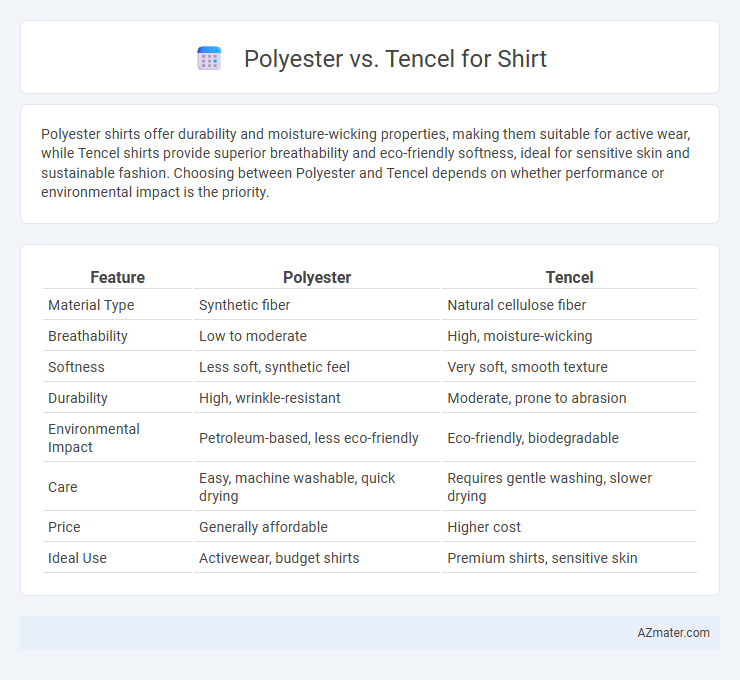Polyester shirts offer durability and moisture-wicking properties, making them suitable for active wear, while Tencel shirts provide superior breathability and eco-friendly softness, ideal for sensitive skin and sustainable fashion. Choosing between Polyester and Tencel depends on whether performance or environmental impact is the priority.
Table of Comparison
| Feature | Polyester | Tencel |
|---|---|---|
| Material Type | Synthetic fiber | Natural cellulose fiber |
| Breathability | Low to moderate | High, moisture-wicking |
| Softness | Less soft, synthetic feel | Very soft, smooth texture |
| Durability | High, wrinkle-resistant | Moderate, prone to abrasion |
| Environmental Impact | Petroleum-based, less eco-friendly | Eco-friendly, biodegradable |
| Care | Easy, machine washable, quick drying | Requires gentle washing, slower drying |
| Price | Generally affordable | Higher cost |
| Ideal Use | Activewear, budget shirts | Premium shirts, sensitive skin |
Introduction to Polyester and Tencel Shirts
Polyester shirts are crafted from synthetic fibers known for durability, wrinkle resistance, and moisture-wicking properties, making them popular for activewear and everyday use. Tencel shirts, made from sustainably sourced wood pulp fibers, offer exceptional breathability, softness, and biodegradability, appealing to eco-conscious consumers. Both fabrics provide distinct benefits, with polyester excelling in strength and Tencel in comfort and environmental impact.
Origins and Production Processes
Polyester is a synthetic fiber derived from petroleum through a polymerization process involving ethylene glycol and terephthalic acid, resulting in durable and wrinkle-resistant fabric. Tencel, branded lyocell, is made from sustainably sourced wood pulp, primarily eucalyptus trees, using a closed-loop solvent spinning process that recycles water and solvents to minimize environmental impact. The distinct origins reflect polyester's petrochemical basis versus Tencel's renewable cellulose source, influencing their sustainability profiles and fabric characteristics in shirt production.
Texture and Comfort Comparison
Polyester offers a smooth, slightly shiny texture that is lightweight and wrinkle-resistant, making it durable but less breathable than natural fibers. Tencel, derived from eucalyptus trees, features a soft, silky feel with excellent moisture-wicking properties, providing superior comfort and breathability ideal for sensitive skin. The natural fibers in Tencel allow better airflow and temperature regulation compared to polyester's synthetic composition, making it a preferred choice for comfort-focused shirts.
Breathability and Moisture Management
Tencel excels in breathability due to its natural cellulose fibers, allowing superior air circulation that keeps the skin cool and dry. Polyester, composed of synthetic fibers, generally traps heat but is engineered for moisture-wicking to rapidly move sweat away from the body. For enhanced moisture management and comfort in warm conditions, Tencel is often preferred, while polyester offers durability and quick drying in activewear.
Durability and Longevity
Polyester exhibits exceptional durability and resistance to wear, making it ideal for long-lasting shirts that maintain shape and color after repeated washing. Tencel, derived from sustainable wood pulp, offers moderate durability with excellent breathability and softness but may show signs of wear faster than polyester under heavy use. Shirts made from polyester generally outlast those made from Tencel in terms of longevity, especially for everyday or activewear.
Environmental Impact and Sustainability
Polyester, a synthetic fiber derived from petroleum, has a significant environmental footprint due to its non-biodegradable nature and reliance on fossil fuels, contributing to microplastic pollution in waterways. Tencel, produced from sustainably sourced eucalyptus trees through a closed-loop process, offers enhanced biodegradability and lower water consumption, making it a more eco-friendly choice for shirts. Choosing Tencel supports reduced carbon emissions and promotes responsible forest management, aligning with sustainable fashion practices.
Care and Maintenance Requirements
Polyester shirts resist wrinkles, stains, and shrinkage, making them easy to wash in cold water and machine dry without losing shape or color. Tencel shirts, derived from sustainably sourced wood pulp, require gentle care such as cold water washing on a delicate cycle and air drying to preserve their softness and prevent fabric damage. Polyester's durability suits low-maintenance lifestyles, while Tencel demands mindful upkeep to maintain its breathability and eco-friendly properties.
Style and Color Retention
Polyester shirts excel in color retention due to their synthetic fibers, which resist fading and maintain vibrant hues even after multiple washes. Tencel, a natural cellulose fiber, offers a softer, more breathable fabric with a matte finish, ideal for a casual, eco-friendly style but may experience gradual color fading over time. Choosing polyester ensures long-lasting, vivid colors perfect for bold fashion statements, while Tencel provides a stylish, sustainable option with a more muted and natural color palette.
Price and Value for Money
Polyester shirts generally offer a lower price point due to the inexpensive production process and durability, making them a budget-friendly option for everyday wear. Tencel shirts, while costlier, provide superior breathability, moisture-wicking properties, and biodegradability, delivering enhanced comfort and sustainability that justify the higher investment. Consumers seeking long-term value often prefer Tencel for its softness and eco-friendly benefits, despite the initial premium price compared to polyester.
Which Shirt Material Should You Choose?
Polyester shirts offer durability, moisture-wicking properties, and wrinkle resistance, making them ideal for active lifestyles and travel. Tencel shirts provide exceptional breathability, softness, and eco-friendly sustainability due to their natural wood pulp origins, perfect for sensitive skin and hot climates. Choosing between polyester and Tencel depends on your need for performance versus comfort and environmental impact.

Infographic: Polyester vs Tencel for Shirt
 azmater.com
azmater.com